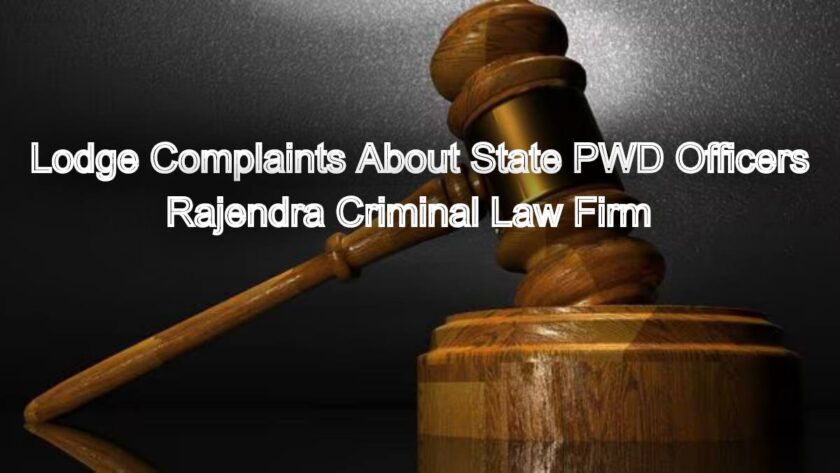How to Lodge Complaints: Public Works Departments (PWDs) are crucial. Indeed, they manage vital infrastructure projects. This includes roads, bridges, government buildings, and water supply systems. They serve the public directly. However, issues can arise. Sometimes, citizens face problems with PWD services or the conduct of their officers. This can range from delays and poor quality work to allegations of corruption or negligence. When such problems occur, knowing how to lodge a complaint is essential. It ensures accountability. It also promotes good governance. Therefore, understanding the proper channels for complaint redressal is vital for every citizen. Rajendra Criminal Law Firm specializes in criminal law and public grievances. We guide citizens through the process of lodging effective complaints against public officers.
How to Lodge Complaints About State Public Works Department (PWD) Officers: Rajendra Criminal Law Firm
Understanding the Grounds for Complaint
How to Lodge Complaints: Firstly, it is important to identify valid grounds for lodging a complaint. Not every dissatisfaction warrants formal action. However, specific issues constitute legitimate grievances.
1. Corruption and Bribery
This is a grave concern. Officers might demand illegal gratification for services. They might also misuse public funds. For instance, an officer might ask for money to clear a project approval. This falls under the Prevention of Corruption Act, 1988. Consequently, such allegations require serious attention.
2. Dereliction of Duty / Negligence
Officers have specific duties. They must perform these diligently. Failing to act or acting carelessly constitutes negligence. For example, a PWD officer might ignore complaints about a dangerous road condition. This can lead to public harm. Consequently, such dereliction can be a ground for complaint.
3. Misuse of Office / Abuse of Power
Public officers hold positions of trust. They must not use their authority for personal gain. They also must not harass citizens. For instance, an officer might deliberately delay a tender process to favor a specific contractor. This is an abuse of power. Consequently, such actions undermine public trust.
4. Harassment or Misconduct
Citizens should receive respectful treatment. Officers must act professionally. Harassment or inappropriate behavior is unacceptable. For example, verbal abuse or discriminatory conduct by an officer merits a complaint. Consequently, such misconduct tarnishes the image of public service.
5. Malpractice in Public Works Projects
This relates to issues in project execution. It includes using substandard materials. It also covers inflated costs. For instance, a newly built road might develop cracks quickly. This suggests malpractice. Consequently, investigations are necessary to hold responsible parties accountable.
Key Avenues for Lodging Complaints
How to Lodge Complaints: Several official channels exist for lodging complaints against PWD officers. The choice of avenue depends on the nature and severity of the grievance.
1. Internal PWD Grievance Redressal Mechanism
Most government departments have internal systems. These handle citizen complaints. For instance, the PWD might have a dedicated complaint cell. They also might have senior officers designated for this purpose. You can usually find their contact details on the PWD website. Consequently, this is often the fastest initial approach.
2. Public Grievance Portals (State and Central)
Governments provide online platforms. These allow citizens to register grievances. For instance, the Tamil Nadu government has a specific public grievance portal. Similarly, the Central Government operates the CPGRAMS (Centralized Public Grievance Redressal and Monitoring System). You can file complaints against any government department here. Consequently, these portals offer a convenient and trackable method.
3. Vigilance and Anti-Corruption Directorates
If corruption or bribery is suspected, these agencies are critical. States have their own Vigilance Directorates or Anti-Corruption Bureaus (ACBs). For example, in Tamil Nadu, it is the Directorate of Vigilance and Anti-Corruption. They specialize in investigating graft cases. Consequently, they possess the legal mandate and investigative powers to take strong action.
4. The Lokayukta / Lokpal
The Lokayukta (at the state level) and Lokpal (at the central level) are independent statutory bodies. They investigate allegations of corruption against public functionaries. For instance, they act as an ombudsman. They offer a strong mechanism for accountability. Consequently, these bodies provide a high-level avenue for redressal.
5. Right to Information (RTI) Act, 2005
The Right to Information (RTI) Act, 2005, empowers citizens. You can request information about government actions. This includes PWD projects or officer conduct. For instance, you can ask for details on funds allocated or project completion reports. While not a direct complaint mechanism, RTI can uncover facts. These facts can then support a formal complaint. Consequently, RTI is a powerful tool for transparency.
6. Police Complaints (Criminal Offenses)
If the officer’s conduct constitutes a criminal offense, a police complaint (First Information Report – FIR) can be lodged. This includes offenses like cheating, criminal breach of trust, or assault. For example, if a PWD officer physically assaults a citizen, a police complaint is appropriate. The Indian Penal Code, 1860, defines such offenses. Consequently, this avenue involves direct criminal prosecution.
7. Court Action (Writ Petitions / Civil Suits)
In certain circumstances, legal action in courts may be necessary. A Writ Petition (under Article 226/227 of the Constitution) can be filed in the High Court. This compels a public authority to perform its duty or cease an illegal act. For instance, if the PWD fails to fix a critical bridge despite repeated requests, a writ petition might be filed. Furthermore, a civil suit for damages can be filed in a civil court if the negligence caused financial loss. Consequently, court action provides a powerful judicial remedy.
Steps to Lodge an Effective Complaint
How to Lodge Complaints: Lodging a complaint effectively requires meticulous preparation and adherence to procedures.
1. Gather All Evidence
Evidence is crucial. Collect documents, photos, videos, and witness statements. For instance, keep records of correspondence with the PWD. Take pictures of poor quality work. Get statements from people affected. Consequently, strong evidence substantiates your allegations.
2. Draft a Clear and Concise Complaint
Your complaint must be well-structured. State the facts clearly. Include dates, times, and specific details of the incident. Identify the PWD officer(s) involved if known. Clearly state the nature of the grievance. For example, instead of saying “bad road,” specify “substandard road construction on XYZ street, completed on [date], showing cracks within [days/weeks].” Consequently, a precise complaint ensures clarity for the investigating authority.
3. Specify the Relief Sought
Clearly state what action you expect. This could be an inquiry, disciplinary action, rectification of work, or recovery of misused funds. For instance, “I seek a thorough inquiry into the officer’s conduct and appropriate disciplinary action.” Consequently, articulating your desired outcome guides the investigating body.
4. Choose the Right Forum
Based on the nature of the complaint, select the most appropriate authority. A corruption charge should go to the Vigilance Directorate. A grievance about delayed work might start with the PWD’s internal cell or the public grievance portal. For instance, filing with the correct body ensures proper jurisdiction. Consequently, this prevents wasted time and effort.
5. Follow Up Diligently
Lodging a complaint is often just the beginning. Follow up regularly. Note down complaint reference numbers. Keep records of all communications. For example, call the grievance cell periodically for updates. Consequently, consistent follow-up ensures your complaint is not overlooked.
6. Seek Legal Assistance
Navigating legal and administrative procedures can be complex. Expert legal assistance is highly beneficial. Attorneys help draft strong complaints. They guide on evidence collection. They also represent you in inquiries or court proceedings. For instance, they understand the nuances of the Prevention of Corruption Act or the Indian Penal Code. Consequently, professional legal support maximizes your chances of a favorable outcome.
The Rajendra Criminal Law Firm Advantage
How to Lodge Complaints: Rajendra Criminal Law Firm specializes in representing citizens in public grievance matters. Our team comprises seasoned legal professionals. We possess extensive experience in navigating the complexities of administrative and criminal law. For instance, we meticulously assist in preparing detailed complaints against PWD officers. We also ensure these complaints adhere to all legal requirements.
Furthermore, we provide strategic guidance on selecting the most effective redressal avenue. We represent clients before various authorities. This includes Vigilance Directorates, Lokayukta, police stations, and courts. Consequently, our proactive approach aims for accountability and justice. We are committed to empowering citizens. We ensure their voices are heard against official misconduct. Rajendra Criminal Law Firm is your trusted partner in asserting your rights against public officers. We fight for transparency and integrity in public service.
How to Lodge Complaints: Frequently Asked Questions
1. What are common reasons to complain about PWD officers?
Common reasons include corruption (e.g., demanding bribes), negligence or dereliction of duty (e.g., ignoring dangerous road conditions), misuse of office or abuse of power, harassment, and malpractice in public works projects (e.g., substandard materials, inflated costs). Each constitutes a legitimate grievance.
2. Which is the first place I should usually lodge a complaint about a PWD officer?
You should typically start with the internal PWD grievance redressal mechanism. Most government departments have dedicated complaint cells or senior officers to handle initial complaints. Alternatively, you can use central or state Public Grievance Portals (like CPGRAMS) for a trackable online submission.
3. If I suspect corruption, where should I complain?
If you suspect corruption or bribery, the most appropriate authorities are the Vigilance and Anti-Corruption Directorates (or Anti-Corruption Bureaus) in your state. These agencies are specifically mandated to investigate cases under the Prevention of Corruption Act, 1988, and have the necessary investigative powers.
4. Can I use the Right to Information (RTI) Act for PWD issues?
Yes, the Right to Information (RTI) Act, 2005, is a powerful tool. While not a direct complaint mechanism, you can use it to request specific information about PWD projects, expenditures, or officer conduct. The information obtained through RTI can then serve as crucial evidence to support a formal complaint.
5. When should I consider legal action or involving the police?
You should consider legal action like a Writ Petition in the High Court if the PWD fails to perform its duty despite complaints. If the officer’s conduct constitutes a criminal offense (e.g., assault, cheating), you can lodge a First Information Report (FIR) with the police under the Indian Penal Code, 1860. Legal counsel is advisable for such steps.
Conclusion
Lodge complaints about State Public Works Department (PWD) officers is a fundamental right of every citizen. It is also a crucial step towards ensuring public accountability and improving governance. From allegations of corruption and negligence to misuse of power and harassment, various grounds warrant action. Understanding the correct avenues, including internal grievance cells, public grievance portals, Vigilance Directorates, Lokayukta, and even direct legal recourse through police or courts, is paramount. Diligent evidence collection, precise complaint drafting, and consistent follow-up are critical for success. Rajendra Criminal Law Firm offers the specialized legal expertise needed to navigate these complex processes effectively. By asserting your rights, you contribute to a more transparent and responsive public service, upholding the principles of good governance.
Read More
- Steps to File Complaints Against Tamil Nadu State Electricity Board (TNEB) Officers
- How to Complain About Municipal Corporation Officers in Your City
- Filing a Grievance Against State Transport Department Officers
- How to File a Complaint Against State Government Officers
- Complaint Mechanism for Revenue Department Officers in State Governments
- Centralized Public Grievance Redress And Monitoring System (CPGRAMS)





